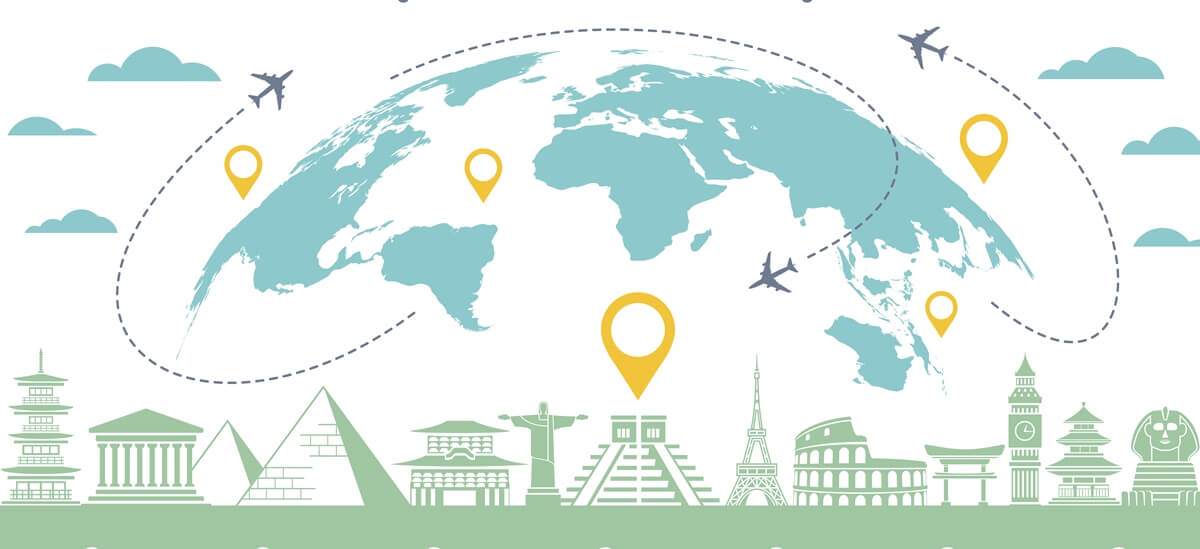Navegação estrutural
-
Guia
-
Travel Guide
-
Benefits of Volunteering Abroad
Benefits of Volunteering Abroad

Volunteering abroad is much more than an act of giving; it's an invaluable journey of personal growth, cultural immersion, and skill development. By bridging gaps between different societies, volunteers gain a newfound global perspective and cultivate qualities like empathy and resilience that stay with them for a lifetime. The influence of volunteering overseas is not only assessed by the improvements made to the communities served, but also by the significant changes that occur within the volunteers' own hearts and minds. This Guidebook dives into the many advantages of volunteering overseas, examining how it can promote personal development, cultural enrichment, and skill development. It goes beyond the obvious level of generosity.
How to Prepare for Volunteering:
Tips and steps to ensure you're ready for your volunteering journey, including planning, cultural sensitivity, and health considerations. Preparing for a volunteering journey involves careful planning, cultural sensitivity, and health considerations. We'll provide you with valuable tips and steps to ensure you're ready for your adventure, making it a meaningful and rewarding experience for all involved.

- Define Your Purpose:
Before you begin planning, take some time for introspection. Understand your motivations for volunteering abroad and identify the causes or issues that resonate with you the most. Having a clear purpose will help you choose the right volunteering program and ensure your efforts align with the community's needs. - Research and Choose Wisely:
Conduct extensive research on potential volunteering opportunities, organizations, and destinations. Look for grassroots initiatives that collaborate with local communities. Consider the project's sustainability and long-term impact. Choose an organization that is transparent about its goals and how it utilizes volunteers' contributions. - Pre-Departure Training:
Some volunteering organizations offer pre-departure training sessions or workshops. Attend these if available, as they can equip you with essential skills, cultural insights, and safety guidelines specific to your destination. This training will help you navigate potential challenges with confidence. - Health Considerations:
Prioritize your health before departing on your journey. Consult with a travel medicine specialist to receive necessary vaccinations and medications. Carry a first-aid kit and familiarize yourself with common health issues in the host country. Additionally, ensure you have health insurance that covers international volunteering. - Financial Planning:
Volunteering abroad may involve expenses such as program fees, travel, and living costs. Create a budget and explore fundraising options to cover your expenses. Crowdfunding platforms, hosting events, or seeking sponsorship from local businesses can help you raise funds while involving your community in your mission. - Prepare Mentally and Emotionally:
Volunteering abroad can be emotionally intense. Prepare yourself for the challenges you may encounter, such as witnessing poverty or facing cultural shocks. Practice self-care techniques like meditation, journaling, or seeking support from family and friends to maintain your well-being throughout the journey. - Pack Wisely:
Pack thoughtfully, considering the climate and cultural norms of your destination. Avoid over-packing and bring only essential items. Don't forget to pack durable clothing suitable for your volunteer work and comfortable shoes for any terrain you may encounter. - Cultural Exchange Workshops:
Organize cultural exchange workshops in your hometown before departure. Engage with people interested in your volunteering destination and share your knowledge about the culture and customs you'll be experiencing. Encourage open dialogue and prepare to absorb valuable insights from others' perspectives. - Ethical Photography and Storytelling:
As a volunteer, you'll have opportunities to capture powerful moments and stories. Be mindful of how you photograph or share experiences involving locals. Seek consent before taking pictures and ensure your storytelling is respectful and empowering, avoiding perpetuating stereotypes or exploiting vulnerability. - Environmental Responsibility:
Adopt eco-friendly practices during your volunteering journey. Encourage sustainable initiatives, such as reducing plastic usage, participating in local clean-up activities, and supporting environmentally conscious projects. Being environmentally responsible shows your commitment to creating positive change on multiple fronts. - Support Local Businesses:
Supporting small businesses and social enterprises will help the local economy. Instead of buying from foreign chains, support local businesses that offer services, food, and souvenirs. Your financial assistance may directly and favorably affect the community's residents' ability to support their families. - Keep a Travel Journal:
In a trip notebook, note the experiences you had volunteering. Keep a journal of the feelings, difficulties, and victories you experience while traveling. This will not only be a priceless memory, but it will also enable you to consider your own development and the long-term effects of your volunteer activity. - Stay Flexible and Adaptable:
Plans may change as a result of unanticipated events when volunteering abroad. Open your mind and embrace adaptation and flexibility. You'll get more out of your volunteer experience if you can adapt to unforeseen circumstances. - Leave a Legacy:
Consider how you can leave a positive, sustainable legacy once your volunteering journey is complete. Collaborate with the local community and project organizers to ensure your efforts have a lasting impact even after you've returned home.
Does Volunteering Abroad Actually Help:
An exploration of the tangible impacts and positive change that volunteering abroad can bring to local communities. It's only natural to wonder about the tangible impacts of volunteering abroad. We'll explore heartwarming stories of how volunteers have made positive changes in local communities worldwide. Through these anecdotes, we'll understand the power of small actions and how they can create a ripple effect of transformation.

- Promoting Gender Equality:
Volunteering abroad often involves initiatives aimed at promoting gender equality and empowering women. Volunteers may organize workshops on gender rights, vocational training for women, or campaigns against gender-based violence. By challenging societal norms and providing opportunities, volunteers contribute to the creation of more inclusive and equal communities. - Preserving Indigenous Cultures:
In regions with indigenous communities, volunteers work to preserve and celebrate their unique cultures and traditions. Through cultural exchange programs, art workshops, and storytelling sessions, volunteers help these communities maintain their identity in the face of globalization and cultural homogenization. - Disaster Relief and Resilience:
Volunteering serves a vital role in disaster-stricken areas, offering essential relief and contributing to the rebuilding process. Volunteers play a crucial part by distributing supplies, establishing temporary shelters, and providing much-needed emotional support to those impacted. Furthermore, they engage in disaster preparedness projects to enhance the community's resilience, ensuring they are better equipped to face future challenges. - Enhancing Food Security:
Volunteers contribute to food security by supporting agricultural projects and sustainable farming practices. They may introduce innovative farming techniques, establish community gardens, or educate locals on nutrition and food preservation. Improved food security leads to healthier and more resilient communities. - Empowering Youth:
Volunteers interact with children, guiding and motivating them to pursue their goals. Volunteers develop the potential of the next generation through educational efforts, leadership training, and sports-related initiatives, producing good role models and potential change agents. - Encouraging Entrepreneurship:
Volunteers frequently work alongside local company owners and entrepreneurs, providing advice and support to help them expand their operations. Volunteers support local economic development and employment creation by encouraging entrepreneurship. - Strengthening Community Bonds:
Volunteering abroad fosters a sense of unity and solidarity within the community. As volunteers work alongside locals on various projects, they build strong relationships and create a support network that transcends geographical boundaries. - Psychological and Emotional Support:
In regions affected by trauma or conflict, volunteers provide psychological and emotional support. By conducting counseling sessions, art therapy workshops, or support groups, they help individuals cope with their experiences and promote healing within the community. - Advocating for Human Rights:
Volunteers frequently take part in advocacy activities, bringing attention to human rights concerns and assisting marginalized groups. Volunteers work to build a more just and equitable society through nonviolent protests, educational campaigns, and lobbying activities. - Bridging the Technology Gap:
Volunteering abroad can involve introducing technological advancements to communities that lack access to modern resources. By setting up computer labs, teaching digital literacy, or providing access to the internet, volunteers empower locals with valuable tools for communication, education, and economic opportunities. - Promoting Inclusive Tourism:
Volunteers encourage local communities to protect their natural and cultural heritage, which helps promote ethical and sustainable tourist practices. They guarantee that tourism helps the neighborhood while protecting the environment for coming generations by encouraging eco-friendly tourism projects.
Skills Needed for Volunteering:
The soft and hard skills that can make your volunteering experience more rewarding and effective. To make the most out of your volunteering experience, certain skills are invaluable. We'll delve into both soft and hard skills that can enhance your contribution, enabling you to leave a lasting impact and forge meaningful connections.

- Patience and Adaptability:
Working in a different cultural context can sometimes be slow-paced or unpredictable. Cultivate patience as you navigate through bureaucratic processes, cultural differences, or unexpected challenges. An adaptable mindset will help you stay composed and find solutions even in unfamiliar situations. - Cross-Cultural Communication:
Beyond just language barriers, cross-cultural communication involves understanding and respecting various communication styles, social norms, and etiquette. Actively listen to the locals, be mindful of your body language, and be aware of any potential cultural misunderstandings. - Positive Attitude:
Maintaining a positive attitude is contagious and can greatly impact the community and your fellow volunteers. Embrace the experience with enthusiasm, optimism, and a can-do spirit, inspiring others to do the same. - Time Management:
Volunteering projects often have strict schedules and deadlines. Good time management skills will help you stay organized, meet project milestones, and ensure that your efforts are productive and impactful. - Resourcefulness:
In resource-limited settings, being resourceful is vital. Whether it's creatively using available materials or finding alternative solutions to problems, resourcefulness allows you to make the most out of what is at hand. - Crisis Management and First Aid:
Depending on your volunteering project, knowing basic first aid and crisis management skills can be crucial. It ensures you are prepared to handle emergencies and provide immediate assistance if needed. - Effective Communication:
Clear and effective communication is crucial in any volunteering experience. Whether it's interacting with the locals, coordinating with fellow volunteers, or expressing your ideas, strong communication skills foster cooperation and understanding. Language barriers may exist, so being patient and using non-verbal cues can be equally important in conveying your intentions. - Empathy and Compassion:
In order to effectively volunteer, one must have the capacity to comprehend and experience the emotions of others. Through a closer connection with the community, empathy enables you to recognize their needs and offer the right kind of help. Your impact will be broad if you approach your volunteer activity with compassion. - Resilience and Flexibility:
It might be difficult to volunteer abroad, both physically and mentally. You may encounter unforeseen obstacles or witness difficult situations. Resilience and flexibility will help you adapt to changes, overcome setbacks, and maintain a positive attitude throughout your journey. - Technical and Professional Skills:
Hard skills relevant to your volunteering project are valuable assets. These skills can vary greatly, from construction expertise for building projects to teaching qualifications for educational initiatives. Utilize your existing expertise or consider gaining relevant training before embarking on your volunteering adventure. - Problem-Solving Abilities:
In resource-limited environments, problem-solving skills become essential. You may need to find innovative solutions to address challenges and create sustainable impacts. Think critically and creatively to tackle problems with limited resources. - Teamwork and Collaboration:
Volunteering often involves working with a diverse group of individuals, both locals and fellow volunteers. Being a team player, respecting differing opinions, and collaborating effectively will enhance the overall impact of your collective efforts. - Celebrating Diversity:
Accept and value diversity in all of its manifestations. Recognize and value the special skills and traits that each volunteer offers to the team, fostering a more welcoming and encouraging environment.
Volunteering Abroad and College Applications:
How volunteering abroad can enhance your college application and demonstrate your commitment to global citizenship. Discover how volunteering abroad can set you apart in college applications. Admissions officers seek well-rounded individuals with a commitment to global citizenship, and your experiences as a volunteer can demonstrate just that.

- Problem-Solving and Adaptability:
Volunteering abroad often comes with unique challenges. From language barriers to resource constraints, you will encounter situations that require quick thinking and adaptability. Overcoming these hurdles demonstrates your problem-solving skills and resilience in unfamiliar situations. Admissions officers appreciate candidates who can tackle real-world problems and adapt to dynamic environments, qualities that indicate your potential to thrive in a college setting. - Independence and Maturity:
Embarking on an international volunteer journey necessitates a specific level of independence and maturity. Living away from home and navigating a foreign environment cultivate self-reliance, time management, and decision-making abilities. These attributes symbolize personal growth and a preparedness to shoulder new responsibilities, all of which become invaluable assets in college life. - Leadership and Teamwork:
Volunteering abroad often involves working with a team of like-minded individuals toward a common goal. Whether you collaborate with locals or fellow volunteers, you'll have the opportunity to exhibit leadership and teamwork skills. Admissions officers seek individuals who can work collaboratively and lead by example. Your experiences as a volunteer abroad can provide concrete examples of your leadership potential and your ability to thrive in a team-oriented academic environment. - Humility and Empathy:
Working as a volunteer in communities facing challenges can be humbling. It teaches you to value what you have and to empathise with the challenges and victories of others. Admissions officials admire humility because it shows a readiness to absorb new information and an openness to different viewpoints. Your experiences as a volunteer abroad demonstrate your capacity for empathy and compassion, qualities that are highly sought after in prospective students. - Initiative and Entrepreneurial Spirit:
Volunteering abroad may require you to take initiative and find creative solutions to local problems. Whether it's organizing fundraisers, initiating educational programs, or setting up sustainable projects, your ability to take charge and show an entrepreneurial spirit speaks volumes about your drive and ambition. Colleges seek individuals who actively engage with their communities and seize opportunities for positive change. - Global Perspective on Academic Goals:
When crafting your college application essays, you can draw upon your experiences as a volunteer abroad to highlight a global perspective on your academic goals. Whether you intend to pursue international relations, global health, environmental sustainability, or any other field, your firsthand experiences from volunteering abroad can offer unique insights into your aspirations. Demonstrating a clear link between your volunteer work and your chosen academic path shows that you have a well-thought-out plan for your future studies. - Respecting Local Wisdom and Knowledge:
Volunteering abroad often involves collaborating with local communities who possess unique wisdom and knowledge about their surroundings. By respecting and valuing their expertise, you demonstrate a willingness to listen and learn from others. This openness to alternative viewpoints and a capacity for respectful engagement are highly desirable traits in college applicants. - A Sense of Purpose and Passion:
Adopting global citizenship through volunteering abroad shows a strong sense of purpose and passion for making a positive impact on the world. Admissions officers value candidates who are driven by a genuine desire to contribute to society and effect positive change. Your volunteer experiences reveal your commitment to meaningful causes, setting you apart from applicants who lack such profound engagement.
Paying to Volunteer Abroad:
An analysis of the pros and cons of paying for volunteer programs and alternative options for volunteering abroad for free. Is paying for volunteer programs worth it, or are there alternative options for volunteering abroad for free? We'll analyze the pros and cons of paid programs and introduce you to various ways you can embark on a volunteering journey without breaking the bank.

Depending on your interests, financial situation, and desired level of support, you must decide whether paying for a volunteer program is worthwhile. Paid programs provide structured experiences and increased safety, but they may not be accessible to everyone and can present moral dilemmas. Fortunately, there are lots of free or inexpensive alternatives that let you have an effect without spending a fortune. Whichever route you take, having a sincere desire to improve the lives of others and to embrace the experience with humility, empathy, and an open heart are the most important aspects of volunteering overseas. Happy serving others!
The Pros of Paying for Volunteer Programs:
- Structured Experience:
Paid volunteer programs often provide a well-structured and organized experience. This means you can expect a clear itinerary, pre-arranged accommodation, and a support network to help you navigate your way through the foreign country. - Enhanced Safety and Security:
Reputable paid volunteer organizations usually take safety seriously. They often have established protocols in place to ensure the well-being of their volunteers, especially in regions where unforeseen challenges may arise. - Specialized Skill Placement:
Some paid programs can connect volunteers with projects that require specific skills or expertise. This can be particularly appealing if you have specialized knowledge to contribute. - Social Impact:
While paying to volunteer may raise eyebrows, it's essential to acknowledge that these organizations often channel a portion of your fees into community projects, contributing to sustainable development and long-term social impact.
The Cons of Paying for Volunteer Programs:
- High Costs:
One obvious drawback of paid volunteer programs is the cost. Fees can be quite substantial, and you might find yourself questioning whether your financial contribution is genuinely reaching the heart of the cause. - Limited Flexibility:
Paid programs often come with fixed schedules and durations, limiting your freedom to customize your volunteering experience to fit your availability and interests. - Ethical Concerns:
Critics argue that the concept of "paying to volunteer" can lead to a sense of privilege and a superficial approach to international development. It raises questions about the motives behind volunteering and whether the focus remains on the communities' well-being or the volunteer's personal growth.
Alternative Options for Volunteering Abroad for Free:
- Work Exchange Programs:
Consider work exchange platforms like Workaway or WWOOF, where you can volunteer in exchange for food and accommodation. These platforms connect travelers with hosts seeking help in various areas, such as farming, language teaching, or eco-projects. - NGOs and Non-Profit Organizations:
Reach out directly to reputable non-governmental organizations (NGOs) and non-profit entities operating in your desired destination. Many of them accept volunteers without charging a fee. - Government-Sponsored Programs:
Some governments offer international volunteering opportunities, especially in fields like teaching, healthcare, and community development. Research and check if your home country or the destination country provides such programs. - Volunteering on Arrival:
It might be worthwhile to arrive in the country first if you're on a long trip and look for volunteer opportunities there. By doing so, you can interact with the local population directly and identify causes that share your interests.
Top Countries for Volunteering Abroad:
An overview of countries with diverse and impactful volunteering opportunities. Explore countries offering diverse and impact volunteering opportunities. From teaching in rural schools to conservation efforts in breathtaking landscapes, we'll present a list of must-visit destinations for aspiring international volunteers.

- Costa Rica - Environmental Conservation:
Costa Rica, which is sandwiched between the Pacific and Caribbean oceans, is a biodiversity and sustainability haven. In this eco-haven, you can work as a volunteer on efforts to conserve endangered animals including sea turtles, monkeys, and sloths. Additionally, you'll get the chance to teach the neighborhood about environmental preservation and practice sustainable farming. Costa Rica offers a unique volunteering experience that builds a deep appreciation for environment, with lush jungles and beautiful beaches as your backdrop. - Nepal - Education and Community Development:
Nepal, the stunning Himalayan country, is renowned not only for its awe-inspiring mountains but also for its friendly and hospitable inhabitants. Volunteering in this region frequently entails instructing subjects such as English and science to children in remote schools. This provides an opportunity to ignite the intellectual curiosity of the youth and make a meaningful contribution to elevating educational levels in rural locales. Additionally, volunteers can play a role in community development initiatives, such as building schools and sanitation facilities, which enhance the overall quality of life in neighboring regions. - South Africa - Social Welfare and Wildlife:
South Africa is a country of stark contrasts, offering volunteering opportunities that address both social and environmental issues. You can collaborate with NGOs that priorities youth empowerment, healthcare, and poverty alleviation in urban areas like Cape Town. You can contribute to initiatives for animal conservation, such as the preservation of critically endangered animals like rhinos and elephants, in the country's extensive wildlife reserves. Volunteering in South Africa allows you to experience the country's cultural richness while making a meaningful impact on the lives of both humans and wildlife. - Thailand - Elephant Conservation:
If you have a passion for wildlife and want to be up close with magnificent elephants, Thailand is the perfect destination. Volunteer projects in Thailand often center around elephant sanctuaries, where you'll help care for these gentle giants rescued from the tourism and logging industries. Your efforts will contribute to promoting ethical treatment of elephants and preserving their natural habitats. Moreover, Thailand's vibrant culture, delicious cuisine, and stunning landscapes will make your volunteer journey all the more unforgettable. - India - Healthcare and Women's Empowerment:
With its extensive history and diverse cultures, India offers a variety of volunteer opportunities. Medical volunteers can work at clinics and hospitals, giving undeserved regions the much-needed healthcare services. You can also take part in programs for women's empowerment that emphasize education, job training, and women's rights. When you volunteer in India, you may support important causes while taking in the country's lively festivals, historic temples, and bustling markets. - Kenya - Sustainable Development and Wildlife Conservation:
Kenya is renowned for its stunning landscapes and incredible wildlife. As a volunteer here, you can engage in projects that promote sustainable development, such as building schools and water wells in rural areas. Additionally, wildlife enthusiasts can participate in conservation initiatives, safeguarding iconic species like lions, cheetahs, and elephants. Volunteering in Kenya provides an unforgettable mix of cultural immersion and close encounters with Africa's magnificent fauna. - Vietnam - Community Development and Environmental Projects:
Vietnam's fascinating blend of ancient traditions and modern progress offers an intriguing volunteering experience. Volunteers can participate in community development projects, focusing on improving infrastructure, education, and healthcare in rural villages. Additionally, environmental programs like marine conservation and reforestation contribute significantly to maintaining Vietnam's natural beauty. By working as a volunteer in Vietnam, you can experience the mouthwatering cuisine, historical landmarks, and warm locals. - Ecuador - Indigenous Communities and Eco-Tourism:
Nestled in the heart of South America, Ecuador beckons with its diverse ecosystems and indigenous heritage. Volunteering opportunities here often revolve around working with indigenous communities, supporting initiatives like sustainable farming and cultural preservation. Additionally, you can contribute to eco-tourism efforts, promoting responsible travel and conservation in the Amazon rain-forest and the Galapagos Islands. Volunteering in Ecuador allows you to connect with ancient traditions and appreciate the country's stunning biodiversity. - Cambodia - Orphanages and Community Initiatives:
Cambodia's rich history and stunning temples make it a compelling destination for international volunteers. In order to provide vulnerable children love, care, and education, many volunteer programs concentrate on orphanages and childcare. Volunteers can also work on community development initiatives including enhancing infrastructure and gaining access to clean water. Volunteering in Cambodia allows you to make a lasting impact on young lives while exploring the wonders of ancient Angkor Wat and experiencing Cambodia's warm hospitality. - Peru - Community Empowerment and Archaeology:
Peru, with its ancient history and awe-inspiring landscapes, offers an exceptional volunteering experience. Projects here can range from working with indigenous communities on sustainable agriculture and women's empowerment initiatives to participating in archaeological digs and preserving historical sites. Volunteering in Peru immerses you in the fascinating world of the Inca civilization while making a tangible difference in the lives of its modern-day descendants.
What You Get Out of Volunteering Abroad:
Personal benefits and growth experienced by volunteers during their time abroad. While volunteering is primarily about giving, volunteers gain immensely from the experience too. Personal growth, cross-cultural understanding, and lasting memories are just some of the benefits volunteers take home. Beyond the altruistic act of giving, volunteers gain invaluable life experiences, cross-cultural understanding, and lasting memories. As they return home with hearts full of compassion and minds enriched with new perspectives, they become ambassadors of change, spreading the spirit of volunteerism and inspiring others to unleash the world within themselves.

- Expanded Perspective and Gratitude:
Seeing life from a different angle profoundly impacts a volunteer's worldview. Exposure to varying socio-economic conditions and cultural practices instills gratitude for the privileges they may have taken for granted. Witnessing the resilience of disadvantaged communities inspires appreciation for the small blessings in life, nurturing a greater sense of gratitude and mindfulness. - Empowerment and Self-Discovery:
As volunteers consider their values, beliefs, and purpose, volunteering overseas promotes self-reflection and introspection. This self-discovery approach can help people better understand their passions, talents, and objectives. Volunteers frequently have a sense of empowerment and direction upon their return, which motivates them to live successful lives that are in line with their actual selves. - Cultivating Humility and Gratitude:
Volunteering abroad humbles individuals as they witness the resilience and strength of communities facing adversity. By reminding them of their privilege and the significance of using it to better others, it promotes humility. The experiences, connections, and beneficial influence that volunteers were able to make leave them with hearts overflowing with gratitude. - Environmental Consciousness:
Volunteering in conservation and environmental projects abroad exposes volunteers to the beauty of the planet and the urgent need to protect it. Engaging in activities like wildlife conservation, sustainable farming, or marine preservation fosters a profound appreciation for nature and its interconnectedness with humanity. Volunteers become ambassadors for environmental conservation, advocating for responsible practices and eco-friendly lifestyles. - Realization of Privilege:
Volunteering abroad allows individuals to confront their own privilege and gain a deeper understanding of social inequalities. By witnessing the challenges faced by disadvantaged communities, volunteers become more conscious of the systemic issues that perpetuate poverty and injustice. This realization often drives them to advocate for social change and contribute to sustainable development initiatives. - Enhanced Problem-Solving Abilities:
In unfamiliar settings, volunteers are frequently required to think creatively and find innovative solutions to local challenges. The experience of working in resource-constrained environments hones their problem-solving abilities, making them more resourceful and adept at finding effective solutions in any context. - Purposeful Connection to Humanity:
Volunteering abroad ignites a sense of purpose as volunteers witness the direct impact of their efforts on the lives of others. This meaningful connection to humanity fuels their desire to continue making a positive difference, whether through continued volunteer work or advocating for social causes.
Ideal Duration for Volunteering Abroad:
Factors to consider when deciding how long to volunteer abroad. Deciding how long to volunteer abroad can be challenging. We'll shed light on the factors you should consider while choosing the duration of your volunteering journey to maximize its impact. By considering the project objectives, your skills, cultural immersion, project sustainability, personal commitments, cost, and language proficiency, you can find the ideal duration for your volunteering journey. The key is to align your passion and dedication with the needs of the community you serve, ensuring a fulfilling and impactful experience for both you and those you assist.

- Project Objectives:
Understanding the goals of the project you want to join is essential before starting your volunteer journey. Due to their urgency, some programs, like those for disaster assistance or short-term medical missions, may only require a temporary commitment. Conversely, community development or education initiatives might require a longer stay to build sustainable relationships and achieve lasting change. Aligning your duration with the project's goals will help maximize your contributions. - Support and Training:
Consider the level of support and training offered by the volunteering organization. Some projects may require more extensive preparation, especially if they involve sensitive issues or working in challenging environments. Longer stays may provide you with additional training and support to excel in your role. - Personal Commitments:
Evaluate your personal commitments and responsibilities at home. Taking extended periods away might not be feasible for everyone. If you have limited time available, opt for projects that fit your schedule without compromising your dedication to the cause. - Work-Life Balance:
Volunteering abroad can be emotionally and physically demanding, especially if you are working in intense or remote settings. Factor in the need for occasional breaks or days off to maintain your well-being and enthusiasm throughout your journey. - Cost and Logistics:
Volunteering abroad involves various costs, such as travel expenses, accommodation, and project fees. Longer duration may require more significant financial resources, but they also provide a more substantial return on your investment in terms of experience and impact. Plan your budget accordingly and explore opportunities for fundraising or grants if needed. - Impact Assessment:
Before committing to a specific duration, research the organization or program you will be volunteering with. Look for testimonials and reviews from previous volunteers to gauge the impact they were able to make during their stay. A well-established and reputable organization will often have a clearer understanding of the ideal duration for their projects. - Seasonal Considerations:
The time of year can significantly impact your volunteering experience. Some projects may be more suitable during certain seasons due to weather conditions or specific community needs. For example, agricultural projects may require volunteers during planting or harvesting seasons, while educational programs may follow the academic calendar. - Alumni Feedback:
Reach out to former volunteers who have participated in the program you are interested in. Alumni can offer valuable insights into their experiences, including the duration they volunteered and how it affected them personally and professionally. - Multiple Volunteering Experiences:
If you have the time and resources, consider dividing your volunteering experience into multiple shorter trips to different locations or projects. This approach allows you to gain diverse perspectives, build a broader network, and contribute to various causes.
Valuable Hard Skills for Volunteering:
Volunteering abroad offers a trans-formative and deeply fulfilling journey. By arming yourself with a range of diverse hard skills, you can forge a more profound and enduring impact on the lives of those you aim to assist. Embrace the opportunity to share your expertise, absorb knowledge from others, and imprint a positive mark on the world through your volunteering endeavors. Your dedicated efforts will undoubtedly contribute to the betterment of our planet for all its inhabitants. Let's delve into specific skills that prove invaluable in enhancing your effectiveness as a volunteer and in positively changing lives.

- Medical and First Aid Training:
In many developing regions, access to proper healthcare is limited. Having medical and first aid training can be invaluable, especially if you're working on healthcare-related projects or remote areas. Your knowledge and skills can help address immediate health concerns, promote health education, and train locals in basic first aid. - Teaching and Education:
Social empowerment is a major outcome of education. If you have teaching abilities, you can support local schools, host workshops, or provide tutoring to aid in the growth of the neighborhood. Your knowledge can contribute to higher literacy rates and a better future for the following generation. - Technical and IT Skills:
Technical and IT abilities are in high demand in practically every volunteer program in the modern digital era. These abilities can be applied in a variety of contexts, such as establishing computer labs, instructing digital literacy, developing websites for neighborhood projects, or offering technological support to start-up companies. - Construction and Engineering:
For projects focused on infrastructure development, construction and engineering skills are incredibly valuable. Whether it's building schools, water supply systems, or community centers, your expertise can significantly impact the community's quality of life and create lasting change. - Environmental and Agricultural Knowledge:
Environmental issues are a problem for communities throughout. You may support local farmers, encourage eco-friendly practices, and contribute to a brighter future if you have knowledge of sustainable agriculture, environmental conservation, or permaculture. - Social Work and Counseling:
Any volunteer must possess empathy and compassion, especially when working with vulnerable communities. If you have social work or counseling experience, you can offer critical help to those who are dealing with trauma, mental health concerns, or difficult life circumstances. Your capacity to offer emotional support and establish safe places can significantly contribute to the community's ability to develop resilience and enhance emotional well-being. - Community Development and Capacity Building:
The goal of community development skills is to enable local communities to sustain themselves. These abilities entail collaborating closely with community members, determining their needs and strengths, and creating initiatives that increase their potential. You may make a long-lasting good influence by enabling the community to take ownership of initiatives. - Entrepreneurship and Business Development:
Fostering growth in underprivileged communities requires actively promoting economic opportunities. If you are knowledgeable in entrepreneurship and business development, you can mentor local business owners, offer financial literacy instruction, or help establish micro-businesses. These initiatives can boost local economic development and lessen poverty. - Environmental Engineering and Sustainable Solutions:
As environmental concerns continue to rise, your knowledge in environmental engineering or sustainability can be a game-changer for volunteering abroad. You can implement eco-friendly solutions, such as renewable energy systems, waste management programs, or water purification techniques, to address environmental challenges and promote a healthier ecosystem. - Disaster Response and Crisis Management:
When volunteering in areas prone to disasters, possessing knowledge and abilities in disaster response and crisis management can prove to be life-saving. Your expertise can assist communities in getting ready for emergencies, formulating evacuation strategies, and reacting efficiently when a disaster occurs. This can reduce the consequences of natural calamities and preserve lives. - Project Management:
Volunteering abroad often involves coordinating various tasks and resources. Project management skills are crucial for planning and executing initiatives effectively. You'll be able to streamline efforts, allocate resources efficiently, and measure the impact of your projects more accurately.
Volunteer Abroad Programs for High School, College Students, and Adults:
Beyond age distinctions, volunteering overseas is a transforming experience. Whether you're an adult looking for fulfilling activities, a college student trying to improve your job prospects, or a high school student seeking personal growth, there is a volunteering opportunity perfectly matched to your individual goals. Participating in these programs enables you to create treasured experiences, form significant relationships with individuals from many cultures, and, most importantly, drastically improve the lives of others. Take advantage of the immense potential of volunteering and set out on a path filled with development, compassion, and global citizenship. To ensure that everyone can find something enriching, let's investigate programs designed to cater to the distinct needs and interests of high school students, college attendees, and adults.

High School Students:
- Student Exchange & Cultural Immersion:
Numerous organizations provide student exchange programs that seamlessly integrate volunteering with cultural immersion. These programs enable high school students to reside with local families and actively engage in community projects, ranging from teaching in local schools to participating in environmental initiatives. It's an outstanding chance to not only learn a new language and immerse oneself in different customs but also to cultivate enduring friendships with peers from diverse backgrounds. - Global Leadership and Empowerment:
Some volunteer programs for high school students put an emphasis on helping young people grow as leaders and become change-makers. Workshops, mentorship programs, and community-driven initiatives that address social concerns like gender equality, youth empowerment, and poverty alleviation are available to participants. - Environmental Conservation and Sustainability:
For eco-conscious high school students, there are programs centered around environmental conservation and sustainable practices. These opportunities often involve tasks like reforestation, wildlife monitoring, and promoting eco-tourism. By participating in these projects, young volunteers can contribute directly to protecting our planet for future generations.
College-Goers:
- Medical & Healthcare Internships:
If you're pursuing a medical or healthcare-related degree, there are volunteering opportunities that allow you to work alongside healthcare professionals in undeserved communities. From assisting in local clinics to conducting health awareness campaigns, these programs provide invaluable hands-on experience and exposure to global health challenges. - Education & Teaching Projects:
College students can donate their time to teach subjects like science, math or English in classrooms all across the world thanks to programs that focus on education. You may positively impact young learners' lives and advance access to high-quality education by funding regional educational projects. - Business and Social Entrepreneurship:
Some volunteer programs put a special emphasis on developing enduring social enterprises for students who are interested in business and entrepreneurship. These programs provide local communities with economic possibilities and skill development in an effort to improve them.
Adults:
- Community Development & Empowerment:
Adults with specialized knowledge in a range of professions can lend their experience to programs promoting community development. These programs allow volunteers to have a lasting impact on the communities they serve, whether it is through financial literacy training, infrastructure development assistance, or support for microfinance ventures. - Conservation and Wildlife Protection:
Volunteering with wildlife conservation projects allows adults to actively participate in preserving endangered species and their habitats. Activities may include wildlife research, habitat restoration, and raising awareness about conservation efforts. - Disaster Relief & Humanitarian Aid:
Adults can participate in volunteer programs devoted to disaster relief and humanitarian aid at times of need. These programs offer crucial assistance to communities afflicted by crisis, war, or natural disasters.
Opportunities for Volunteering Abroad for Free:
We have solutions for people on a tight budget. We'll demonstrate to you how to locate and take advantage of free volunteer opportunities without sacrificing the value of your experience. Financial limitations don't have to prevent you from fulfilling your ambition of volunteering abroad. You can find fantastic free volunteering options that not only let you make a real contribution but also improve your life in unimaginable ways by being resourceful, proactive, and showing off your passion. Accept the voyage, discover the world, and improve both your own and other people's lives!

- Local Community Centers and Places of Worship:
Check with local community centers, churches, mosques, or temples that might have connections with international outreach programs. They may offer guidance or connections to organizations involved in volunteer work abroad.
- Alumni Associations and University Programs:
If you're a student or recent graduate, reach out to your university's alumni association or international programs office. Some universities have partnerships with organizations that offer volunteer opportunities to their alumni or students.
- Volunteering Networks and Facebook Groups:
Join online volunteering networks and Facebook groups dedicated to volunteering abroad. These platforms often have members who share their experiences, tips, and recommendations for free or low-cost opportunities.
- Language Exchange Programs:
Consider participating in language exchange programs that involve teaching your native language in exchange for language lessons or cultural experiences. These arrangements can lead to enriching volunteer opportunities in foreign countries.
- Utilize Social Media:
Follow volunteering organizations, NGOs, and influences on social media. Sometimes, they may post urgent calls for volunteers, and if you're quick to respond, you might secure a free opportunity.
- Support Local NGOs with Global Initiatives:
Get involved with local NGOs that have global initiatives or partnerships. By working with them on local projects, you might become eligible for international volunteering opportunities they offer.
- Volunteering Grants and Scholarships:
Look for grants and scholarships specifically designed for volunteering abroad. Several organizations and foundations offer financial aid to passionate volunteers who demonstrate commitment and dedication to their chosen cause.
- Crowdfunding and Fundraising:
If you're unable to find fully funded opportunities, consider starting a crowdfunding campaign or organizing fundraising events within your community. Friends, family, and local businesses might be willing to support your noble cause, helping you fulfill your dream of volunteering abroad.
- Connect with Returned Volunteers:
Reach out to individuals who have previously volunteered abroad. They may have contacts or insights into organizations that provide free opportunities, and their firsthand experiences can be invaluable.
- Consider Long-Term Volunteering:
While short-term volunteer opportunities are more popular, long-term commitments can be rewarding and more likely to offer additional benefits such as accommodation and food.
- Seasonal and Short-Term Opportunities:
Keep an eye on seasonal or short-term projects, as they often have a higher demand for volunteers and may offer more incentives, such as free accommodation and meals.
- Teach English Abroad:
Teaching English is in high demand worldwide. Several countries offer opportunities to volunteer as an English teacher, and in return, you might receive accommodations and a stipend.
- Peace Corps or VSO:
Investigate international volunteering programs like the Peace Corps (for US citizens) or Voluntary Service Overseas (VSO) for citizens of various countries. They offer comprehensive volunteering experiences, covering expenses during your service.
- Work with Wildlife Conservation Projects:
If you have a passion for wildlife, some conservation projects offer free volunteering opportunities, particularly if you're willing to stay for an extended period.
Volunteer Opportunities for Teens:
Specific programs and initiatives for teenage volunteers. Teenagers, too, can make a significant impact through volunteering. We'll highlight specific programs and initiatives designed to empower and engage young volunteers in making a positive difference. Volunteering abroad presents a fantastic opportunity for teenagers to discover the world, grow as individuals, and make a lasting impact on communities and causes they are passionate about. Through programs like Global Leadership Adventures, AFS Intercultural Programs, Projects Abroad, Cross-Cultural Solutions, and Rustic Pathways, young volunteers can gain unique insights, broaden their perspectives, and become more empathetic global citizens. So, if you're a teenager looking to make a difference and embark on a life-changing adventure, consider volunteering abroad - the world is waiting for your unique contribution!

- Global Leadership Adventures (GLA):
Global Leadership Adventures offers a diverse range of service-learning programs for teens across Africa, Asia, Europe, and Latin America. Their programs combine volunteer work with cultural immersion, leadership development, and adventure activities. Whether it's teaching English to local students, participating in environmental conservation efforts, or working on community development projects, GLA enables teens to become global citizens and understand the world from a broader perspective. - AFS Intercultural Programs:
AFS provides international exchange programs that promote intercultural understanding and global citizenship. As a teenage volunteer with AFS, you can engage in various community service projects while living with a host family abroad. This immersive experience allows you to develop cross-cultural communication skills, empathy, and a deeper appreciation for different ways of life. - Projects Abroad:
Projects Abroad offers an array of volunteer opportunities designed specifically for teenagers. From conservation and wildlife projects to teaching and healthcare initiatives, they cater to various interests and passions. By participating in these projects, teens not only make a difference in communities worldwide but also learn about pressing global issues and contribute to sustainable solutions. - Cross-Cultural Solutions (CCS):
CCS specializes in short-term volunteer programs for teenagers in multiple countries, focusing on areas such as education, healthcare, and social work. Their programs promote cultural sensitivity and emphasize the significance of sustainable, community-driven development. Through CCS, teens can actively engage in addressing social challenges while forming meaningful connections with locals and fellow volunteers. - Rustic Pathways:
Rustic Pathways offers impact volunteer and service-learning programs for teenagers in over 20 countries. These programs emphasize experiential learning, leadership development, and fostering an appreciation for diversity. From building schools and clean water projects to working on environmental conservation efforts, Rustic Pathways ensures teens have a memorable and trans formative volunteering experience abroad. - Habitat for Humanity Global Village:
Habitat for Humanity offers Global Village programs that enable teenagers to participate in building safe and affordable housing in various countries. These experiences promote teamwork, leadership, and construction skills while directly improving the lives of families in need. - United Nations Volunteers (UNV) Online Volunteering:
Teens who prefer virtual volunteering can engage with UNV's Online Volunteering platform. They can contribute to projects addressing global challenges, such as human rights, environmental sustainability, and education, from the comfort of their homes. - Greenheart Travel:
Greenheart Travel provides eco-conscious volunteer programs for teens interested in environmental conservation and sustainability. Participants can get involved in projects like reforestation, wildlife protection, and sustainable farming in destinations worldwide. - GIVE (Growth International Volunteer Excursions):
GIVE offers trans formative volunteer trips for teenagers, emphasizing sustainable development in communities across Asia, Africa, and Central America. Teens can participate in initiatives like building schools, installing water systems, and supporting local entrepreneurs. - International Student Volunteers (ISV):
ISV organizes volunteering opportunities for teens interested in wildlife conservation, community development, and environmental stewardship. They offer programs in destinations like Australia, Costa Rica, and Thailand, combining volunteering with adventure and cultural experiences. - Red Cross Youth:
Many countries have Red Cross Youth programs that involve teenagers in disaster response training, community outreach, and first aid initiatives. By joining these programs, teens can develop essential life-saving skills and contribute to their communities' safety and well-being. - The Ocean Cleanup:
For teens passionate about ocean conservation, The Ocean Cleanup provides volunteering opportunities to clean up coastlines and waterways. This organization focuses on removing plastic waste to protect marine life and promote cleaner oceans. - World Health Organization (WHO) Youth Volunteers:
The WHO offers youth volunteer opportunities for teens interested in global health and public service. Teens can contribute to projects addressing healthcare challenges and health promotion in various regions. - Save the Children Youth Ambassadors:
Save the Children's Youth Ambassadors program enables teens to advocate for children's rights and well-being worldwide. Ambassadors participate in awareness campaigns, fundraising events, and community engagement activities. - Peace Corps Youth Programs:
The Peace Corps offers various programs for teenagers, such as the Peace Corps Prep program, which helps prepare students for international service, and the Coverdell Fellows program, which offers scholarships for returned Peace Corps volunteers pursuing higher education.

